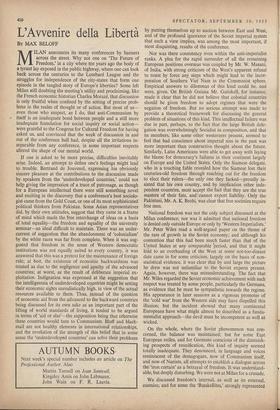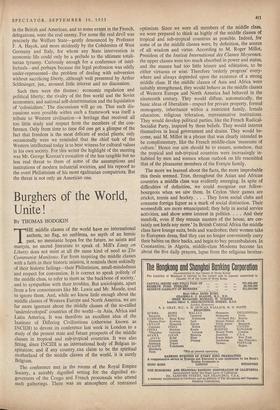L'Avvenire della Liberta
BY MAX BELOFF MILAN announces its many conferences by banners across the street. Why not one on 'The Future of Freedom,' in a city where ten years ago the body of a tyrant lay exposed in the public highway, where one can look back across the centuries to the Lombard League and the struggles for independence of the city-states that form one episode in the tangled story of Europe's liberties? Some left Milan still doubting the meeting's utility and proclaiming, like the French economic historian Charles Moraze, that discussion is only fruitful when confined by the setting of precise prob- lems in the realm of thought or of action. But most of us— even those who suspect, as I do, that anti-Communism by • itself is an inadequate bond between people and a still more inadequate foundation for social inquiry or social action— were grateful to the Congress for Cultural Freedom for having asked us, and convinced that the week of discussion in and out of the conference hall had, despite all the irritations in- separable from any conference, in some important respects altered the shape of our mental world.
If one is asked to be more precise, difficulties inevitably arise. Indeed, an attempt to define one's feelings might lead to trouble. Bertrand de Jouvenel, expressing his obviously sincere pleasure at the contributions to the. discussion made by speakers from the 'underdeveloped countries,' could not help giving the impression of a trace of patronage, as though for a European intellectual there were still something novel and exciting in the discovery that a conference's best sociolo- gist came from the Gold Coast, or one of its most sophisticated political thinkers from Pakistan. Some Asian representatives did, by their own attitudes, suggest that they came in a frame of mind which made the free interchange of ideas on a basis of total equality—the freedom and equality of the university seminar—an ideal difficult to maintain. There was an under- current of suggestion that the abandonment of 'colonialism' by the white races was far from complete. When it was sug- gested that freedom in the sense of Western democratic institutions was not equally suited to every country, it was answered that this was a pretext for the maintenance of foreign rule; at best, the existence of economic backwardness was treated as due to the negligence and ,apathy of the advanced countries; at worst, as the result of deliberate imperial ex- ploitation. Indignation was expressed at the suggestion that the intelligentsia of underdeveloped countries might be setting their economic sights unrealistically high, in view of the actual resources available to them. Thus, instead of the question of economic aid from the advanced to the backward countries being discussed for its own sake as an important part of the lifting of world standards of living, it tended to be argued in terms of 'aid or else'—the supposition being that otherwise these countries would turn to Communism. Bluff and black- mail are not healthy elements in international relationships, and the revelation of the strength of this belief that in some sense the 'underdeveloped countries' can solve their problems by putting themselves up to auction between East and West, and of the profound ignorance of the Soviet imperial system that such a view implies, was among the most important, if most disquieting, results of the conference.
Nor was there consistency even within the anti-imperialist ranks. A plea for the rapid surrender of all the remaining European positions overseas was coupled by Mr. W. Masani, of India, with strong criticism of the West's apparent refusal to resist by force any steps which might lead to the incor- poration of Southern Viet Nam in the Communist sphere. Empirical answers to dilemmas of this kind could be, and were, given. On British Guiana Mr. Gaitskell, for instance, made it clear that he did not believe that colonial countries should be given freedom to adopt regimes that were the negation of freedom. But no serious attempt was made to provide a theoretical framework for discussing the general problem of situations of thik kind. This intellectual failure was due in part, perhaps, to the fact that the large British dele- gation was overwhelmingly Socialist in composition, and that its members, like some other westerners present, seemed to feel that bad conscience about imperial sins in the past was more important than constructive thought about the future. Similarly, Latin Americans were able to get away with laying the blame for democracy's failures in their continent largely on Europe and the United States. Only the Siamese delegate, who in a touching fable revealed how the Siamese lost their centuries-old freedom through reaching out for the freedom to elect their rulers—the only one they lacked—proudly in- sisted that his own country, and by implication other inde- pendent countries, must accept the fact that they are the true masters of their fate, and cannot export liability. Only the Pakistani, Mr. A. K. Brohi, was clear that free societies require free men.
National freedom was not the only subject discussed at the Milan conference; nor was it admitted that national freedom is denied only outside Europe or only by 'Western Imperialists.' Mr. Peter Wiles read a well-argued paper on the theme of the rate of growth in the Soviet economy; and although his contention that this had been much faster than that of the United States at any comparable 'period, and that it might lead to an overhauling of the West at some not-too-distant date came in for some criticism, largely on the basis of non- statistical evidence, it was clear that by and large the picture he drew was not unfamiliar to the Soviet experts present. Again, however, there was misunderstanding. The fact that Mr. Wiles regarded the Soviet economic achievement with such respect was treated by some people, particularly the Germans, as evidence that he must be sympathetic towards the regime. His appearance in later sessions as a vigorous promoter of the 'cold war' from the Western side may have dispelled this illusion; but the incident showed that many continental Europeans have what might almost be described as a funda- mentalist approach—the devil must be incompetent as well as wicked.
On the whole, where the Soviet phenomenon was con- cerned, the balance was maintained; but for some Est European exiles, and for Germans conscious of the diminish- ing prospects of reunification, this kind of inquiry seemed totally inadequate. They denounced, in language and voices reminiscent of the demagogues, now of Communism itself, and now of Nazism, all attempts to establish a dialogue across the 'iron curtain' as a betrayal of freedom. It was understand- able, but deeply disturbing. We were not at Milan for a crusade.
We discussed freedom's internal, as well as its external, enemies; and for some the 'Butskellites,' strongly represented in the British and American, and to some extent in the French, delegations, were the real enemy. For some the real devil was precisely the Welfare State—gently denounced by Professor F. A. Hayek, and more stridently by the Cobdenites of West Germany and Italy, for whom any State intervention in economic life could only be a prelude to the ultimate totali- tarian tyranny. Curiously enough for a conference of intel- lectuals—and perhaps because the legal profession was oddly under-represented—the problem of dealing with subversion without sacrificing liberty, although well presented by Arthur Schlesinger, jun., aroused little interest and no discussion.
Such then were the themes: economic regulation and political liberty; the rivalry of the free world and the Soviet economies; and national self-determination and the liquidation of 'colonialism.' The discussions will go on. That such dis- cussions were possible within such a framework was itself a tribute to Western civilisation—a heritage that received all too little study and respect from the members of the con- ference. Only from time to time did one get a glimpse of the fact that freedom is the most delicate of social plants; only occasionally were we reminded that the chief task of the Western intellectual today is to bear witness for cultural values in his own society. For this writer the highlight of the meeting was Mr. George Kennan's evocation of the less tangible but no less real threat to them of some of the assumptions and institutions of modern industrial societies, and his reproof to the overt Philistinism of his more egalitarian compatriots. But the threat is not only an American one.



































 Previous page
Previous page